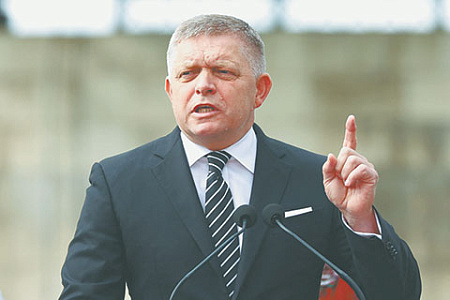
The European Union’s anticipated 19th package of anti-Russia sanctions is now projected for November, a departure from the initial October timeline. What was once a seemingly insurmountable hurdle—Hungary’s customary veto—appears to have been navigated, according to media reports from Brussels. However, a fresh obstacle has emerged in the form of Slovakia. Its Prime Minister, Robert Fico, reportedly backed by Austria, Germany, and Italy, is insisting that the stringent new measures be debated directly at the upcoming EU summit on October 23rd, rather than through the usual ambassadorial channels, effectively delaying their adoption.
This latest round of sanctions, initially slated for approval at a permanent representatives’ meeting on October 8th, is understood to go beyond the typical expansion of blacklists for Russian individuals, entities, and export categories. Leaks to media outlets like Bloomberg suggest a significant broadening of punitive scope. The package is expected to target an additional 120 vessels comprising Russia’s so-called “shadow fleet,” escalating the total number of restricted vessels to approximately 560. These ships are reportedly circumventing existing European sanctions by transporting Russian goods.
A particularly novel aspect of the proposed sanctions aims at the facilitators of this illicit maritime activity. For the first time, firms providing fraudulent documentation for de facto Russian tankers—which often operate under flags of convenience from self-governing Dutch territories in the Caribbean such as Curaçao, Aruba, and Sint Maarten—will face penalties. This move signals an escalation in the EU’s efforts to dismantle the intricate networks enabling Russia’s circumvention of restrictions.
Moreover, The Financial Times reports that the package includes a groundbreaking restriction on the movement of Russian diplomats. Under this proposed measure, diplomatic personnel would be confined solely to the Schengen country that issued their visa. This initiative has been a long-standing demand from the Czech Republic, which argues it is essential to counter alleged Russian intelligence activities operating under diplomatic cover. While Hungary had previously opposed this specific sanction, it is now reportedly prepared to drop its veto at the permanent representatives’ meeting, a move some observers suggest could be a calculated maneuver.
The timing of Hungary’s apparent reversal coincides with a significant political shift in the Czech Republic. A new government is on the horizon, potentially led by Andrej Babiš, leader of the ANO party, which recently won parliamentary elections. Babiš is often characterized as a pro-Russian politician and an ally of Hungarian Prime Minister Viktor Orbán, though the validity of this association is debated. Should the new Czech administration reconsider its stance on diplomatic movement restrictions, Germany and Italy – traditionally wary of broad visa limitations – might align with them. This potential shift creates a complex dynamic, with Slovakia’s insistence on a summit-level discussion effectively buying time for the evolving Czech political landscape to crystallize.
Slovakian Prime Minister Fico’s rationale for demanding a full EU summit discussion, rather than an expedited approval via ambassadors or foreign ministers, remains somewhat opaque. However, it is noteworthy that Austria also opposes a swift adoption of the sanctions package. This combined resistance suggests that the European Commission’s initial hopes for an October implementation of the new restrictions are now highly unlikely, pushing the timeline further into the autumn.
Unsurprisingly, the delay has drawn criticism from the staunchly anti-Russian quartet of Poland, Lithuania, Latvia, and Estonia. These nations consistently advocate for the most radical measures against Moscow. Their frustration, however, was recently met with an unexpected intervention from former German Chancellor Angela Merkel. In a recent interview with the Hungarian podcast Partizan, Merkel provocatively suggested that in 2021, Poland and the Baltic states effectively sabotaged agreements between the EU and Russia concerning Ukraine. She attributed this to their fear of a lack of “common policy toward Russia.” This statement was widely interpreted as an implicit challenge to the quartet, urging them to temper their demands and reflect on their historical role in exacerbating EU-Russia relations.
The response from Poland and the Baltic states was swift and defiant, largely dismissing Merkel’s comments or appearing to deliberately misinterpret them. An Estonian MP’s sharp retort, labelling Merkel “stupid or pretending to be stupid,” underscored the intensity of their conviction. Estonian Foreign Minister Margus Tsahkna articulated the prevailing sentiment, asserting that “in our region, Russia’s true nature was recognized quite a long time ago” and that “Russia understands only force.” This exchange highlights the deep-seated divisions and historical perspectives that continue to shape the EU’s complex approach to its eastern neighbor.
